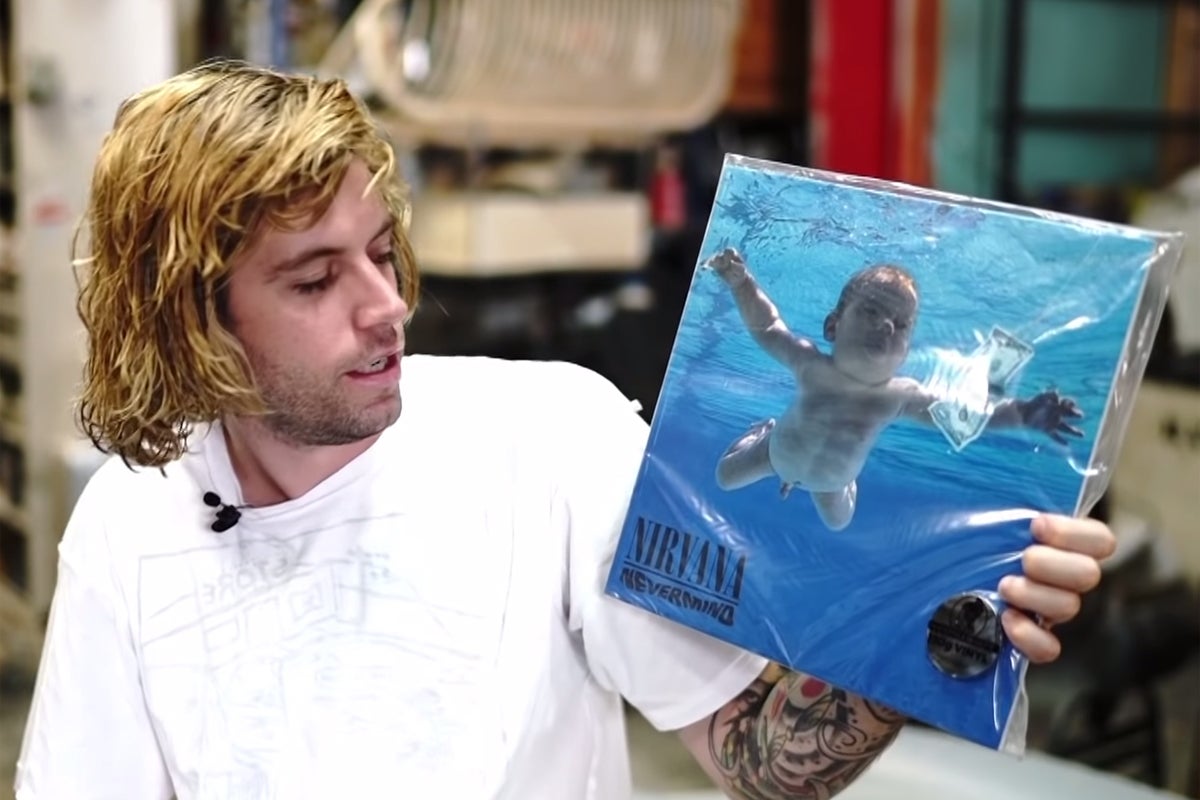Nevermind the lawsuit – maybe the Nirvana baby deserves more than a dollar now he’s a grown-up?
Spencer Elden claims the nude image of him as an infant on the band’s iconic album cover constitutes child pornography. Whatever you think of his claim, it’s hard to complain about the man seeking to get paid


Is there anything more apt than the Nirvana baby desperately grabbing at a dollar as a grown-up? You may have read by now that Spencer Elden, the star of the iconic photo that graced the cover of the band’s classic Nevermind, is doing just that via a lawsuit.
There are 15 defendants, including the surviving members of the band and the estate of lead singer Kurt Cobain. The legal swim he’s taking as an adult is a fairly tasteless one. Elden claims that the “lasciviously displayed” nude image of him as a baby constitutes child pornography.
Non-sexualised photos of infants aren’t usually considered as such under US law. If they were, half the baby albums in the country would be in evidence boxes and Facebook would be out of business. But his lawyer is alleging that the dollar bill he seems to be reaching for, which was added to the photo after it was staged, is what creates the problem. We are told that it makes it seem like he’s a “sex worker”.
And no. Just no. The exploitation of sex workers is a serious societal problem. Ditto child porn. Nevermind’s cover is neither.
The controversial parts of the suit – he’s also claiming his parents never signed a release – seem obviously designed as a tactic to elicit publicity (so well done there) and a settlement (we’ll see). Surely they are? Smells like teen money. Except that Elden is now past 30.
But while we might abhor the approach he and his lawyer have taken, it’s hard to complain about the man seeking to get paid. He became an unwitting part of a pop cultural phenomenon before he was even conscious of pop culture or any other kind.
Every generation X-er of a vaguely alternative bent, and plenty who weren’t, bought the album and knows the image. It has shifted 30 million copies and counting, making it one of most successful of all time.
Some of us bought it two or three times, having worn it out through repeated plays or in search of the extras on the special edition – cash-ins that Geffen, the band’s label, released to grab themselves some more dollars to fatten the enormous bank it booked from the album.
Sure, no one would know “that’s the guy” were they to walk past a poster of him. It’s impossible to recognise someone from a baby photo without the aid of a sophisticated computer programme. And even that’s not always reliable. But Elden sure knows it’s him. He knows it’s his most intimate parts on display, even if it’s ridiculous of him to suggest the intent was pornographic.
Apropos that, consider this: We Gen X-ers will be aware that one of the worst embarrassments it was possible to endure growing up in the pre-Facebook era was bringing a date home and having your mum trot out the baby photos.
Those dates often then got a look at how we behaved as teenagers when those photos were revealed too. “Oh for God’s sake MUM!”
Poor Elden. He, and his dates, are confronted with his baby photo on posters, record sleeves, news reports, books, online discussion forums. And it goes on. And on. And on.
Sure, he’s previously staged revivals of the shoot for anniversaries of the album’s release, just with shorts covering the offending, and more mature, male appendage.
In some interviews he’s been positive about it. Some not so much. But he’s surely benefitted to some degree from the limited fame it has generated for him. But perhaps not to the extent he should have given the notoriety of the image and the obvious role it played in the promotion of a wildly successful album.
Yes, yes, the music was the chief driver of that. But no one should under-estimate the importance of the sleeve, the image, and the product as a whole.
People change and while Elden might sometimes wake up feeling ok about it all, he might feel very differently at other times, which might help to explain the inconsistent interviews.
The creative arts are also littered with examples of people getting paid minuscule fees for important roles in projects that go on to become mega hits. Elden, of course, wouldn’t have been aware if he was getting ripped off when the picture was taken, reportedly for a couple of hundred dollars. He didn’t ask to entertain us as teens when the lights were out, or on, and the records or CDs were spinning.
Crass the lawsuit may be, but there’s an awful lot of money from the project still being generated and there’s plenty still sloshing around. It isn’t too much for him to ask that some of it finds its way into his pocket.
Maybe he uses the proceeds to move somewhere in, I don’t know, Alaska? Places with limited broadband and less chance of seeing himself so he can concentrate on his art in peace. Maybe he blows a settlement on legal Lithium to escape the psychological impact of his unsought after fame.
But one thing’s for certain. Nevermind is never not going to be on Spencer Elden’s mind. He’ll never be completely free of it.
Join our commenting forum
Join thought-provoking conversations, follow other Independent readers and see their replies
Comments
Bookmark popover
Removed from bookmarks